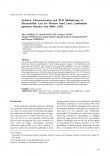Ten novel microsatellite markers were developed for the western sand lance, Ammodytes japonicus, which has decreased significantly in many fishing grounds because of overexploitation and deterioration of its habitat. The 10 markers were successfully amplified in two sets of multiplex polymerase chain reactions (PCR). A total of 63 individuals collected in two successive years from a single population were used to assess the characteristics of the 10 markers. The number of alleles per locus ranged from seven to 24 with the observed heterozygosity ranging from 0.397 to 0.921. None of the loci deviated significantly from the Hardy-Weinberg equilibrium, and there was no evidence of linkage disequilibrium between any loci-pairs. Almost all of these novel microsatellite markers were also confirmed to be successfully amplified, not only for the other regional A. japonicus, but also for the closely-related Ammodytes heian and Ammodytes hexapterus. These polymorphic microsatellite markers for multiplex PCR will largely improve the throughput of microsatellite DNA analysis, and contribute to the effective genetic monitoring of A. japonicus and other sand lances around Japan.

